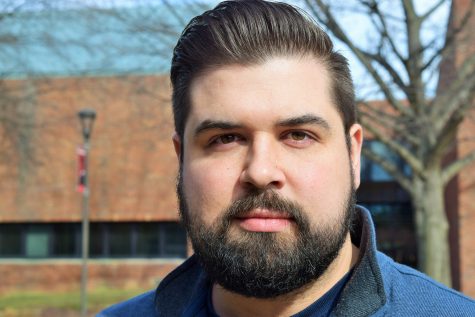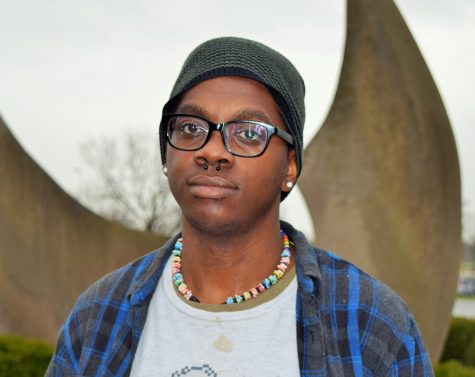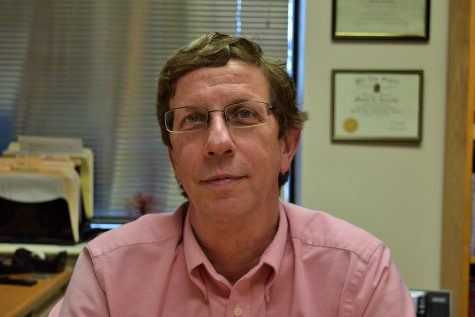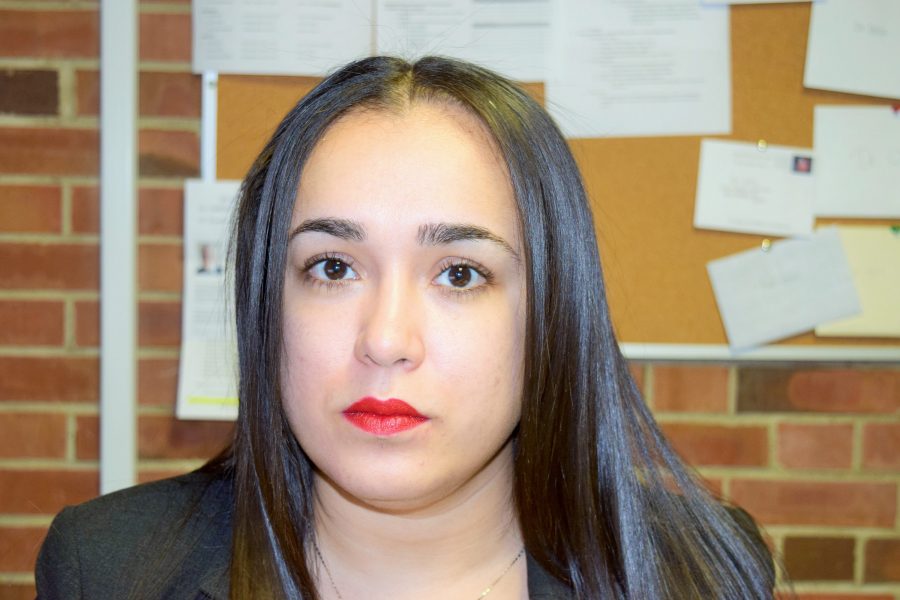LGBT in the Trump Era
Members and supporters of the LGBT community discuss their concerns
“You are loved,” Ortiz said. “You are perfect exactly the way you are. You are not alone in this. There are people willing to fight for you.”
March 5, 2017
Member from the Chancellor’s Advisory Council on Diversity
Nicholas Moore, marketing and professional selling senior, has been an active advocate and member of the Lesbian, Gay, Bisexual and Transgender community during his years at IU Southeast.
Moore is currently a member of the Chancellor’s Advisory Council on Diversity.

In 2016, Moore served as vice president of Spectrum (formerly the Gay Straight Alliance), and was the co-director of the annual drag show on campus.
Moore also arranged for Pennsylvania State Rep. Brian Sims to come speak at IU Southeast. Sims is the first openly gay representative to serve in the Pennsylvania House. Known for his advocacy for LGBT and women’s rights, Sims spoke about the need for diversity, the fight for social justice and how to rise above adversity to achieve success.
With every new president comes a lot of changes. Change can often trigger many emotions and new concerns.
Moore said his biggest concern with President Donald Trump’s administration is people not caring enough to develop or cultivate empathy for those they disagree with.
According to Moore, some people tend to have issues they hold so close to their heart that they refuse to budge on them. There is only black or white for them, with no middle ground. They become so polarized on these issues that they often fail to develop a deeper understanding of the issue itself.
Moore said he understands how some people within liberal communities may fear for their own safety. However, arguing back and forth is not going to change public policy.
“We have to remember to try and discover ways we can speak to each other as human beings,” Moore said. “Especially when we have strong disagreements.”
He said something that gives him hope for the next four years is social media. It gives an open platform to people who are dissatisfied with where we are as a country, and with public policy being passed at the federal, state and local levels.
“People now know, in real time, as soon as they pick up their phone and open an app, they are not alone if they are upset about something happening with our government,” Moore said.
Moore acknowledges that sharing dissatisfaction on social media isn’t going to change policy. However, he said it can be empowering to many people, which is a necessary start to any movement.
With so many people fearing discrimination, Moore said allies are needed more than ever. Everything people do to move their communities forward needs to reflect that.
He said now, more than ever, we need to work together to inspire our communities and legislators to help protect people who face discrimination.
“We’re only going to do that with their help, and we have to make sure that they feel like they are on our team in this cause,” Moore said.
Moore said this is where inspiring empathy plays a big role.
“We must remember not only what our own feelings are but also what the feelings of others might be,” Moore said. “It’s only when we begin with answering those questions that our work can truly begin to be effective.”
Students from Spectrum Speak Out
Formally known as the Gay Straight Alliance, Spectrum is one of the oldest student organizations at IU Southeast.
Samantha Newby, criminal justice sophomore and member of Spectrum, has several concerns about the new administration.
Newby said she fears a lot of the progress made under former President Barack Obama’s administration will be undone. She worries about her brothers and sisters in the armed services as she wonders if the former “don’t ask, don’t tell” policy will be reinstated.
On Feb. 22, Trump signed an executive order rescinding Obama’s previous order directing public schools to allow transgender students to use the bathroom that corresponds with their gender identity. Newby said she is concerned about the impact the new policy direction will have on transgender persons.
Newby said she worries there will be increased discrimination against the LGBT community. She fears that if people face more discrimination than they previously had to, it may raise suicide rates in a community already heavily impacted by suicide.
Newby expressed a strong desire to become more active in the community; to help fight for their rights and better educate people. However, she said she feels a bit lost when it comes to getting involved.
“I want to get involved,” Newby said. “I just don’t know how.”
Newby said that is why she decided to join Spectrum. She hopes joining will connect her with fellow members and advisors and, with their help, she can discover how and where to start.
Stephon Camp, theatre junior and member of Spectrum at IU Southeast, said he thinks Trump is moving very quickly in terms of issuing executive orders and making changes.
“He is moving very fast,” Camp said. “It kind of seems like there are no checks and balances going on.”

Camp said there is a positive side effect of Trump becoming president.
“The good thing is, he is uniting people,” Camp said. “He is making people more active.”
Camp said he believes, after this election, people will better understand the importance of voting. His hope is more people will get to the polls in future elections.
When it comes to the media on politics, Camp said he tends to be on the skeptical side. He said you should fact check everything you see and hear, especially when someone is considering who to vote for.
Camp said many stories in the news or online tend to be presented as one-sided. He said people should try to understand both sides of a story or argument before making any judgments.
Camp said many younger people in the LGBT community do not know the history of the community. They do not understand how hard the people who came before them fought for the rights they enjoy today. He used the annual Pride festival as an example.
“Some people don’t understand Pride,” Camp said. “Pride isn’t just about sex. It is about celebrating because you made it another year”
Camp encourages young members to learn about where they came from. He said you need to know where you came from to understand what it is you are fighting for.
“It’s not like the fight was already over and now we are being set back,” Camp said. “The fight is still on.”
Camp said the LGBT community needs to stay strong and press forward, regardless of what is going on in government. He believes, if the community keeps fighting for gains and keeps making forward progress, it will only get harder to push them back.
Leo Lopez, sociology junior and member of Spectrum at IU Southeast, said he marvels at how far the LGBT community has come in the past few decades. He marvels at how hard they have fought, but fears many of the hard-won rights people in the LGBT community have been granted will be stripped from them.
“It’s easy to get discouraged,” Lopez said. “But if you see the work of people, the ones who aren’t relenting, the ones who made this happen, then it is hard not to be optimistic.”
Lopez said they have been the oppressed; the invisible people. But they refuse to be so from now on.
“We fight back,” Lopez said. “That’s what we do because that’s what we have always done,”.
Lopez finds inspiration from historical activists within the LGBT community, such as Harvey Milk, who became the first openly gay office holder in California.
“Harvey Milk cemented with his historic speech, ‘Brothers and sisters, you must come out’. These words will never be forgotten,” Lopez said. “The reason why we stand here with pride and honesty with who we are is because everyone knows at least one gay person.”
Lopez said the normalization of people within the LGBT community and its visibility has changed the attitudes of millions of people in less than a decade.
“We need to come out. We need to change policy. We need to educate.” Lopez said.
Elliot Bonsall, criminal justice junior and president of Spectrum, paraphrases the words of Dan Savage with the hope of uplifting those who are feeling oppressed.
“It gets better,” Bonsall said. “It always gets better. Just because things are down now doesn’t mean they will be down later on. It will get better.”
Faculty Advisors of Spectrum
Michael Abernethy and Jennifer Ortiz both help advise Spectrum.
Abernethy, lecturer of communication studies, said he thinks the LGBT community made great strides during the Obama administration, and gained a lot in terms of recognition and rights.
“Naturally, the concern is that those forward steps will be rolled back,” Abernethy said.
Abernethy said we have already seen that with the transgender bathroom order that Trump signed.
“If you recall, President Obama issued an order saying that transgender persons should be allowed to use the bathroom of their choosing,” Abernethy said. “Trump reversed that.”
Trump’s order relegates the transgender bathroom issue from a federal issue to a states’ issue, meaning each state government would decide their state’s bathroom guidelines.
“I disagree with that,” Abernethy said. “I don’t think civil rights is a state’s matter. I think it is a constitutional right.”

no matter who wins,”
Abernethy said. “Nothing changes until you get
out of that funk and
start looking towards
the future.”
Abernethy said he believes the U.S. Constitution does not dictate who people should be or how they should identify themselves.
“Clearly this administration has shown it has no problems instituting discriminating policies,” Abernethy said.
Abernethy expressed concern over the antagonism Vice President Mike Pence displayed towards the LGBT community during his tenure as governor of Indiana.
“The Religious Freedom Restoration Act would be the most glaring example,” Abernethy said. “It basically told businesses they had the right to discriminate against LGBT customers.”
Abernethy also pointed to Pence’s advocacy of conversion therapy, which Abernethy said has been shown to be psychologically damaging and completely ineffective. Pence has also endorsed the shutting down of Planned Parenthood, which, as Abernethy noted, offers affordable services to people with HIV.
Abernethy’s concerns also extend to Trump’s Supreme Court appointment, though he does grant the president has the right to name whomever he wants to the supreme court.
“With his first choice, he has already shown he is going to be picking justices who place business concerns above individual freedoms,” Abernethy said.
Abernethy said another concern raised by the actions of the Trump administration is that the more the president, or those in power, disenfranchise citizens, the more citizens may feel free to disenfranchise one another.
“I think we have already seen that with the increase in hate crimes against so many different communities,” Abernethy said. “[By people] who do so proudly saying this is the era of Trump, it’s their turn to be in control.”
Despite his many concerns, Abernethy did note some areas he is not too worried about. For one thing, he believes some of the rights LGBT members gained during the Obama administration are not going away anytime soon.
“Gays and Lesbians in the military. I don’t see that going away,” Abernethy said. “I don’t think gay marriage is going to be overturned simply because the Supreme Court tends to be hesitant to overturn one of their own decisions so soon after it’s been announced.”
Abernethy said he thinks even Republicans realize the bureaucratic and financial nightmare that would come from trying to undo marriages that are already on the books.
“For those who think in terms of ‘everything is a business,’ gay marriage is good business. It pumps a lot of money into the economy,” Abernethy said. “There is a whole industry that thrives off marriage, not to mention honeymoons.”
According to Abernethy, marriage tends to add a sense of stability in a household that just living together does not.
“A more stable household contributes more, economically,” Abernethy said.
Abernethy said the activism he sees in young people is another reason he has hope for the next several years.
“There is an energy and enthusiasm in young people,” Abernethy said. “[Enthusiasm] to not accept everything that comes out of Washington as acceptable simply because it comes from the government.”
Abernethy said if people are upset about what is going on in the government then they need to start thinking about the 2018 midterm elections.
“Should the democrats take back either the house or the senate then I think you’ll see a lot of the Trump agenda come to a grinding halt,” Abernethy said. “He will no longer have that free pass through congress he has now.”
Abernethy encourages people to stay informed because knowledge is power. He said if people are upset about what is going on then they should be more active.
“Useless anger does no good,” Abernethy said. “Sitting at home being angry helps no one. It doesn’t help you. It doesn’t help society. It doesn’t help our culture. If your anger is that strong, channel it into something creative.”
Abernethy said there are plenty of organizations, whatever a person’s interest may be, where they can do a lot of good. If there are not any organizations that represent them or their interest, Abernethy suggested creating one.
Ortiz, assistant professor of criminology and criminal justice and fellow Spectrum advisor, also expressed concerns for the LGBT community.
“Our most vulnerable members are going to be treated worse than they have been previously,” she said.
Ortiz said that her biggest concern is for transgender individuals in the wake of Trump’s executive order concerning them and bathrooms.
Ortiz said that since the 1960s, the LGBT community has seen slow but steady forward momentum in terms of gaining civil rights. Under the Obama administration’s eight years in office, the LGBT community saw consistent progress.
“Now I feel like everything we have fought so hard for is going to be taken away,” Ortiz said. “Slowly but surely.”
Ortiz fears there will be an increase in discrimination in the workplace. While she has the comfort of working in academia, where she feels professors can largely be themselves, she said the same isn’t true for other professions.
Ortiz has an openly gay friend who teaches at a public high school who she said lives in constant fear of losing his job.
“I’m afraid of losing rights such as adoption rights in the few states in which LGBT members actually have adoption rights,” Ortiz said. “Will those states now feel empowered to take away those rights?”
Ortiz also commented on the potential for increased suicide rates within the LGBT community. She cited a new study that concluded same-sex marriage policies were linked to a significant drop in rates of teenage suicide.
“If you start taking away people’s rights, of course I think it will increase rates of suicide,” Ortiz said.
Ortiz said millennials give her hope as they are a generally progressive, forward-thinking group.
“As much as millennials have a bad rap, I think millennials will probably change the world more than any other generation,” Ortiz said. “Except for the generation in the 1960s.”
Ortiz has several suggestions for people who are unhappy with the direction the government is taking.
First, Ortiz recommends getting involved. For those who do not know how or where to start, she suggested they can start by reaching out to the major organizations.
Ortiz said students can volunteer or donate money to organizations such as the Human Rights Campaign and American Civil Liberties Union.
According to Ortiz, these organizations will undoubtedly be major allies for the LGBT communities in court. She said they are looking for people who are willing to do something as simple as picking up a phone and reaching out to others.
She said people can donate their time to local LGBT organizations.
Ortiz said another place to start is by keeping informed of what local and state governments are doing. Keep an eye out for bills they are proposing. Then write a letter to local and state politicians.
“It may seem like a letter does not do much,” Ortiz said. “But… enough letters can do something.”
Ortiz said keeping yourself informed is just as important as getting involved. She said she understands not wanting to hear bad news, but believes that as citizens, people have an obligation to inform themselves. Especially when it comes to what laws are being proposed.
“It’s a civic responsibility that we inform ourselves and fight back,” Ortiz said. “No change has ever come from sitting on the sidelines.”
Ortiz said people need to begin preparing now for the 2018 election cycle. She said it is time to take back our elections. To do so, people must make informed decisions.
Her next big recommendation is to take care of other people.
“There are people who need help, even if it is just someone to listen,” Ortiz said. “We have a responsibility to do that.”
More importantly, Ortiz said it is vital that people take care of themselves.
“You have to take care of yourself,” Ortiz said. “If you’re not OK, you can’t fight the good fight.”
Ortiz said people should not lose hope.
“We’ve come a long way from the Stonewall riots in 1969,” Ortiz said. “We’ve got a long way to go. But there are people who can be out today, who weren’t out in their twenties, who feel more comfortable. We are moving in the right direction. Don’t lose hope.”


